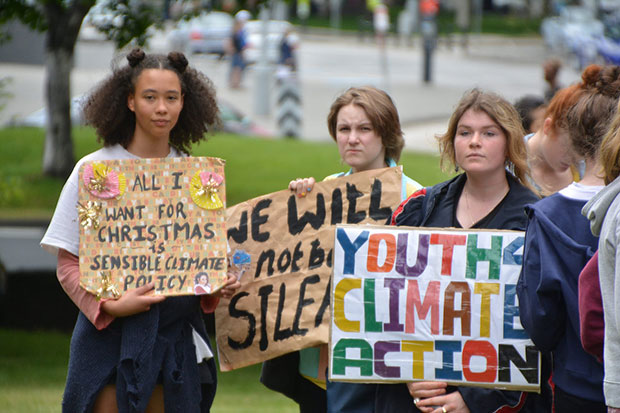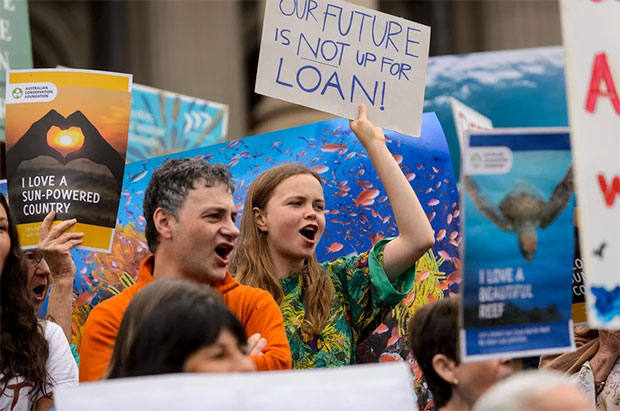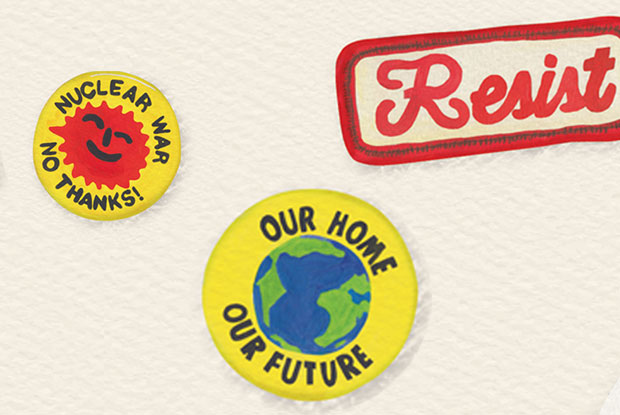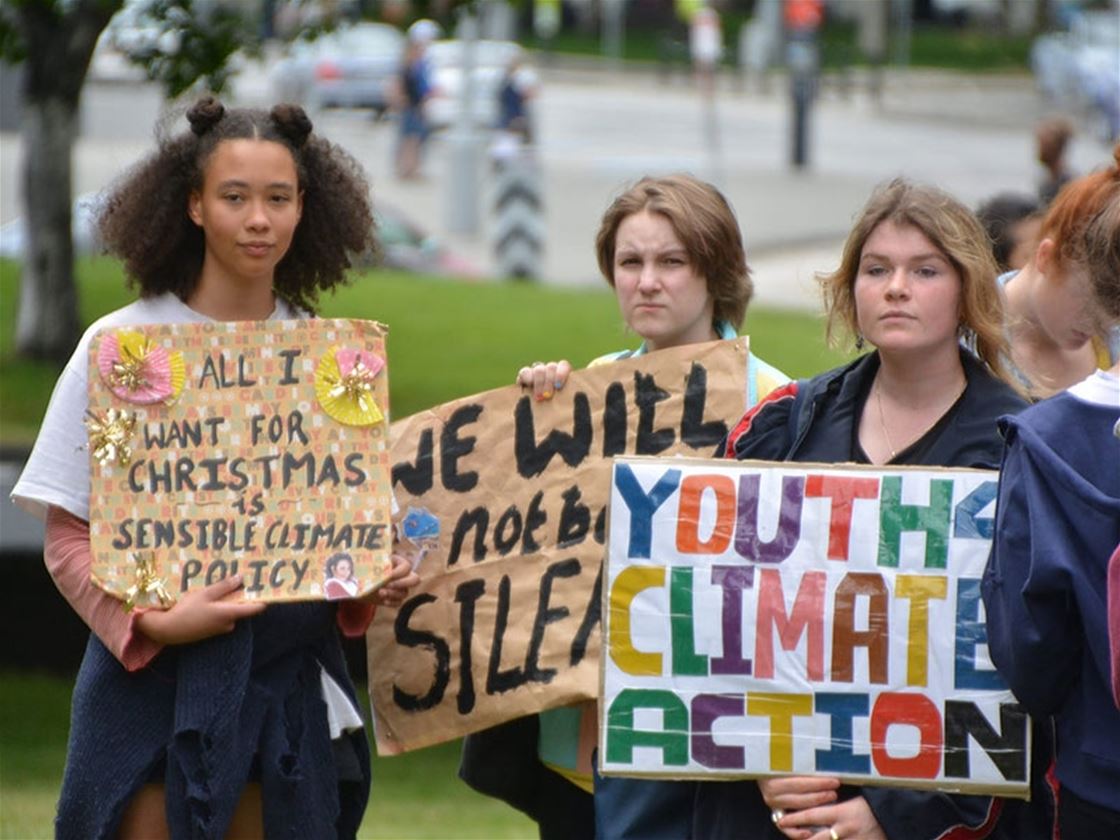students striking for climate change action speak out
"If you're really passionate about climate change action and feel like you're doomed, don't lose hope. There are so many people out there that care."
Anyone labelling the youth as lazy and apathetic hasn't met our current crop of school students. Last November, thousands of young students put down their pens and took to the streets to protest the government's inaction on climate change. Ahead of an upcoming federal election, they're headed back out this Friday, March 15th as part of a global strike to jolt the pollies into action. We chatted to 16-year-old Anica Renner and 17-year-old Emma Demarchi from Melbourne to hear about why they're skipping school to protest.

image from School Strike 4 Climate.
How did you get involved in climate activism? AR: Last year, I got involved with the Australian Youth Climate Coalition and through that, met a lot of inspiring young people. I knew a lot of school students planning the school strike so I came along to one of the meetings and went headfirst into the movement.
ED: I heard about it on social media and thought it was really cool so I contacted Tipping Point, the organisation that was running the strike then. I actually spoke at the previous strike in November last year and after that, decided it would be a good idea to take more of a forward role because I was incredibly passionate about the cause.
You both striked for the first time last November. What was that like? AR: It felt really empowering to be there. Before the strike, I knew that people cared, but actually seeing how many people, just from Melbourne alone, turned up – who chose the hassle of leaving school to come to the strike – really opened my eyes and gave me new hope as to where the movement could go.
ED: We saw people come from absolutely everywhere in the state, which was so good because it debunks the myth that climate activism is an inner city, lefty, millennial issue. We had Indigenous and Torres Strait communities, Pacific Islander people and even people from mining and fossil fuel communities. I also got up and spoke about the idea of intergenerational theft – basically that politicians and older people are making policy decisions that directly affect the youth but we have no say in these decisions.
Why do you think a strike is one of the most effective ways to make your voice heard? AR: We’re students so a lot of us can’t vote. So unfortunately, we don't have that tool to contribute to democracy and politics. And we don't have jobs, so if we strike, no one is affected but us. Performing this civil disobedience really gives weight to the whole movement and shows how much we want to see action against climate change.
image from School Strike 4 Climate.
What would say to the adults who would rather you stay in school than strike? ED: We have civics education in school for a reason. My teachers have gone on strike plenty, as have nurses and doctors. Why can't we? We are just exercising our right to strike.
AR: They need to wake up and realise that the school strike is actually a fantastic learning opportunity. I would also say that we want you to represent the future voters of this country – that’s us young people. The government is currently making policies in the interest of the past but we are the future.
What makes you so passionate about climate justice? ED: The first issue I was really passionate about was family safety for women and children. But then I kind of sat back and was like, “Oh my god, what’s the point of me caring about family violence when our planet is in such dire need of saving. Am I even going to have a planet to care about other things on?”
AR: I've always cared about the environment, but as soon as I found out climate change was an issue for people and not just the Earth, I got really invested. We’re often told that climate change is an issue because polar bears are dying, but really, climate change is also a massive social justice issue. The people affected by climate change are not necessarily the ones contributing to its rise. I also have friends who have been personally impacted by bush fires in Tasmania and floods in Queensland. They actually feared for their lives, and I don't think that should be happening. The science shows that we’re going to continue experiencing extreme weather patterns unless something changes.
What will you be striking for this Friday? AR: We’ll be asking politicians to stop the Adani coalmine; for no new coal or gas projects in Australia; and 100 per cent renewable energy in Australia by 2030. At the strike, we’ll have some people directly affected by climate change speak about their experience and also highlight some things students can do after the strike is finished.
ED: The Adani coalmine in particularly is incredibly problematic – according to the IPCC report, it’s going to be the largest coalmine in the Southern Hemisphere. There’ll be crazy carbon emissions coming from there; wildlife will be put in danger; and they haven’t gotten approval from Indigenous elders. It’s a very messy project on all fronts.
Want to bring about political change? We've got a few strategies over here.
What’s been the reaction from your school? AR: My school hasn't told us not to go to the protest, though I know some schools have done so. My school has a diplomatic approach. They can't make it a legally authorised event, so students have to get their parents to sign them out of class. Other than that, they think that students’ voices should be heard.
ED: My school's incredibly good when it comes to social justice issues like this. Toilets have been vandalised – as in people have scrawled messages to get the word out – which isn't such a bad thing. There's a good conversation about it among students.
What’s your advice to other students who want to come along but won’t be able to? AR: Accessibility is a bit of an issue for the strike movement because some people might not be able to afford missing a day of school. But that's why there are so many other events for students to take part in such as campaigns and MP meetings – it’s not just about missing school. The AYCC website and School Strike 4 Climate website are good places to start if you want to get involved.
What’s your message to the young people reading who feel a little hopeless about the issue? ED: Come out to the strike. It is such a friendly and hopeful environment. When you talk about climate change, you usually get a bit depressed but when you get there on the day, it's like, “Holy shit, there are 20,000 people on the road all here for the same thing.” It’s amazing.
AR: If you're really passionate about climate change action and feel like you're doomed, don't lose hope. There are so many people out there who care. While you may think your sphere of influence as a young person is every small, you have a whole future where you can fight for this. Talk to people around you about what they think, keep your eye on the news and keep yourself educated.
Check out School Strike 4 Climate for full details on the Australian marches.














.jpg&q=80&w=316&c=1&s=1)













.jpg&q=80&w=316&c=1&s=1)










